The Lack of Healthcare Access in Rural Australia: An Opinion Editorial
VerifiedAdded on 2022/11/24
|7
|1661
|108
Essay
AI Summary
This opinion editorial examines the critical issue of limited healthcare access in rural Australia, highlighting its detrimental impact on human dignity and the principle of common good. The essay explores the disparities in medical assistance and proper health care experienced by rural populations compared to those in major cities, citing statistics on smoking rates, road accidents, and cancer screening to illustrate the severity of the problem. It attributes the lack of access to factors such as poverty, inadequate education, and the nursing profession's practices, which include poor staff practice and low interpersonal communication. The editorial emphasizes the importance of nurses promoting human dignity and common good by improving communication skills, understanding cultural views on healthcare, and ensuring equal care for all patients. The author suggests that by implementing these principles, the nursing profession can help bridge the healthcare gap and improve the well-being of rural Australians.
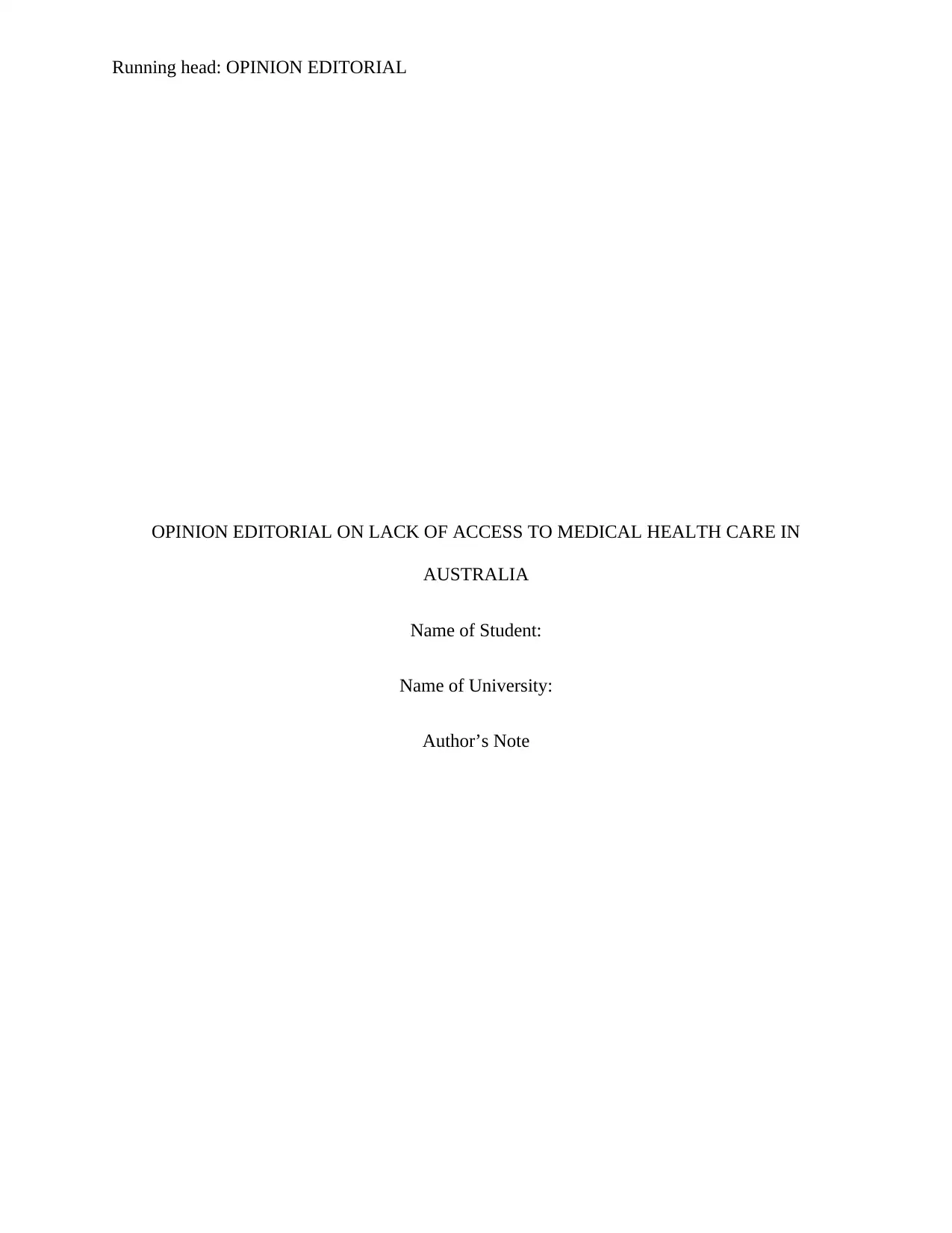
Running head: OPINION EDITORIAL
OPINION EDITORIAL ON LACK OF ACCESS TO MEDICAL HEALTH CARE IN
AUSTRALIA
Name of Student:
Name of University:
Author’s Note
OPINION EDITORIAL ON LACK OF ACCESS TO MEDICAL HEALTH CARE IN
AUSTRALIA
Name of Student:
Name of University:
Author’s Note
Paraphrase This Document
Need a fresh take? Get an instant paraphrase of this document with our AI Paraphraser
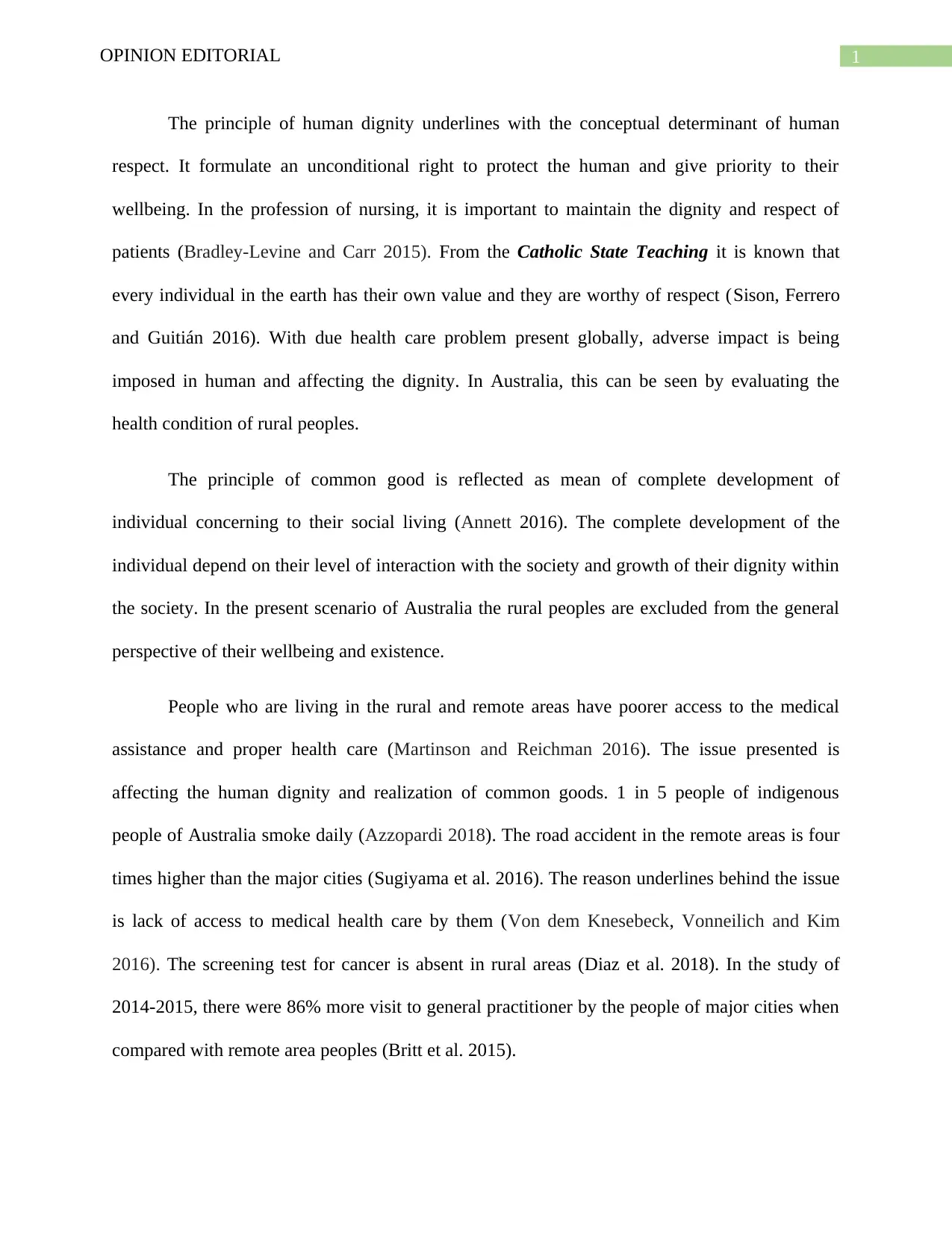
1OPINION EDITORIAL
The principle of human dignity underlines with the conceptual determinant of human
respect. It formulate an unconditional right to protect the human and give priority to their
wellbeing. In the profession of nursing, it is important to maintain the dignity and respect of
patients (Bradley-Levine and Carr 2015). From the Catholic State Teaching it is known that
every individual in the earth has their own value and they are worthy of respect (Sison, Ferrero
and Guitián 2016). With due health care problem present globally, adverse impact is being
imposed in human and affecting the dignity. In Australia, this can be seen by evaluating the
health condition of rural peoples.
The principle of common good is reflected as mean of complete development of
individual concerning to their social living (Annett 2016). The complete development of the
individual depend on their level of interaction with the society and growth of their dignity within
the society. In the present scenario of Australia the rural peoples are excluded from the general
perspective of their wellbeing and existence.
People who are living in the rural and remote areas have poorer access to the medical
assistance and proper health care (Martinson and Reichman 2016). The issue presented is
affecting the human dignity and realization of common goods. 1 in 5 people of indigenous
people of Australia smoke daily (Azzopardi 2018). The road accident in the remote areas is four
times higher than the major cities (Sugiyama et al. 2016). The reason underlines behind the issue
is lack of access to medical health care by them (Von dem Knesebeck, Vonneilich and Kim
2016). The screening test for cancer is absent in rural areas (Diaz et al. 2018). In the study of
2014-2015, there were 86% more visit to general practitioner by the people of major cities when
compared with remote area peoples (Britt et al. 2015).
The principle of human dignity underlines with the conceptual determinant of human
respect. It formulate an unconditional right to protect the human and give priority to their
wellbeing. In the profession of nursing, it is important to maintain the dignity and respect of
patients (Bradley-Levine and Carr 2015). From the Catholic State Teaching it is known that
every individual in the earth has their own value and they are worthy of respect (Sison, Ferrero
and Guitián 2016). With due health care problem present globally, adverse impact is being
imposed in human and affecting the dignity. In Australia, this can be seen by evaluating the
health condition of rural peoples.
The principle of common good is reflected as mean of complete development of
individual concerning to their social living (Annett 2016). The complete development of the
individual depend on their level of interaction with the society and growth of their dignity within
the society. In the present scenario of Australia the rural peoples are excluded from the general
perspective of their wellbeing and existence.
People who are living in the rural and remote areas have poorer access to the medical
assistance and proper health care (Martinson and Reichman 2016). The issue presented is
affecting the human dignity and realization of common goods. 1 in 5 people of indigenous
people of Australia smoke daily (Azzopardi 2018). The road accident in the remote areas is four
times higher than the major cities (Sugiyama et al. 2016). The reason underlines behind the issue
is lack of access to medical health care by them (Von dem Knesebeck, Vonneilich and Kim
2016). The screening test for cancer is absent in rural areas (Diaz et al. 2018). In the study of
2014-2015, there were 86% more visit to general practitioner by the people of major cities when
compared with remote area peoples (Britt et al. 2015).
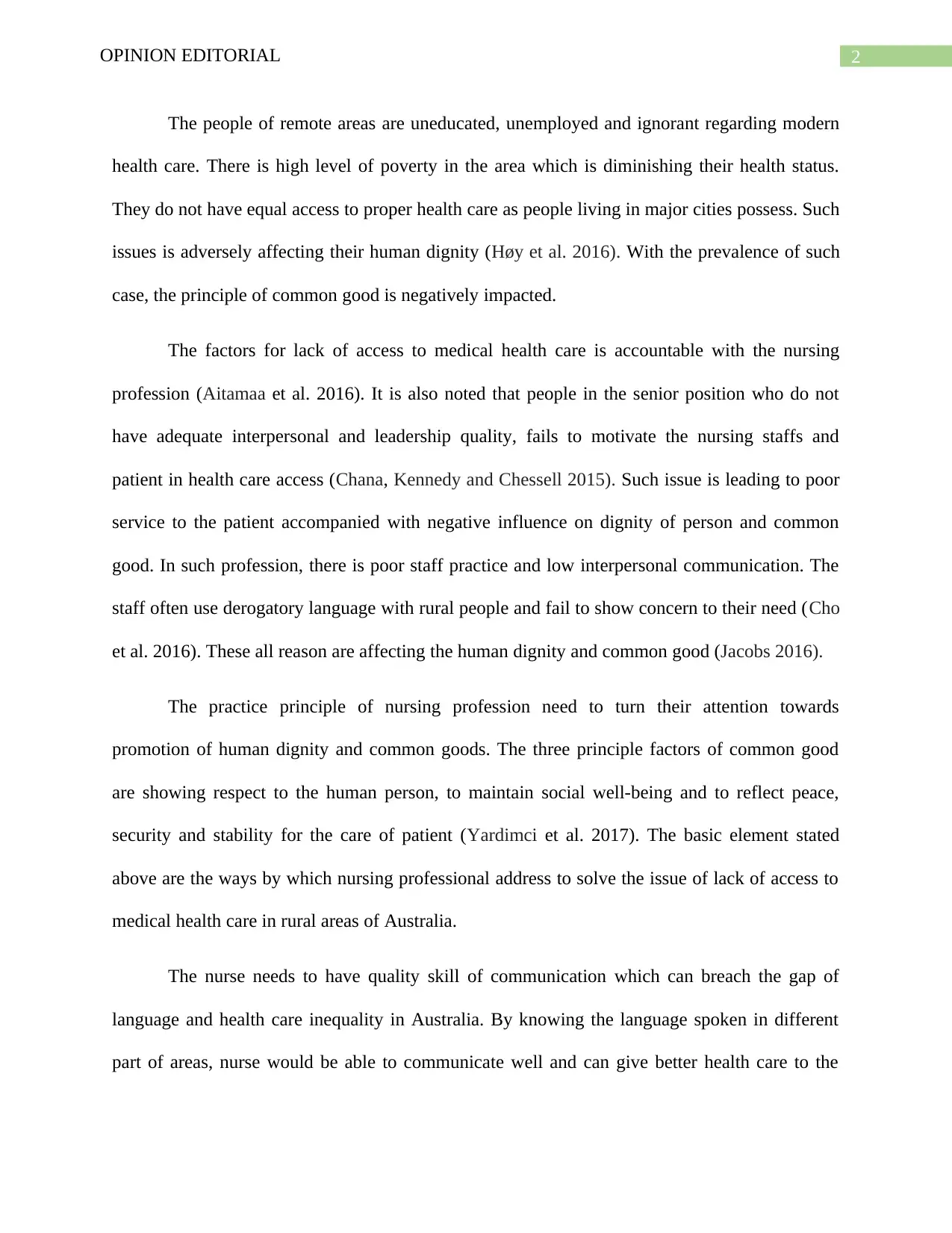
2OPINION EDITORIAL
The people of remote areas are uneducated, unemployed and ignorant regarding modern
health care. There is high level of poverty in the area which is diminishing their health status.
They do not have equal access to proper health care as people living in major cities possess. Such
issues is adversely affecting their human dignity (Høy et al. 2016). With the prevalence of such
case, the principle of common good is negatively impacted.
The factors for lack of access to medical health care is accountable with the nursing
profession (Aitamaa et al. 2016). It is also noted that people in the senior position who do not
have adequate interpersonal and leadership quality, fails to motivate the nursing staffs and
patient in health care access (Chana, Kennedy and Chessell 2015). Such issue is leading to poor
service to the patient accompanied with negative influence on dignity of person and common
good. In such profession, there is poor staff practice and low interpersonal communication. The
staff often use derogatory language with rural people and fail to show concern to their need (Cho
et al. 2016). These all reason are affecting the human dignity and common good (Jacobs 2016).
The practice principle of nursing profession need to turn their attention towards
promotion of human dignity and common goods. The three principle factors of common good
are showing respect to the human person, to maintain social well-being and to reflect peace,
security and stability for the care of patient (Yardimci et al. 2017). The basic element stated
above are the ways by which nursing professional address to solve the issue of lack of access to
medical health care in rural areas of Australia.
The nurse needs to have quality skill of communication which can breach the gap of
language and health care inequality in Australia. By knowing the language spoken in different
part of areas, nurse would be able to communicate well and can give better health care to the
The people of remote areas are uneducated, unemployed and ignorant regarding modern
health care. There is high level of poverty in the area which is diminishing their health status.
They do not have equal access to proper health care as people living in major cities possess. Such
issues is adversely affecting their human dignity (Høy et al. 2016). With the prevalence of such
case, the principle of common good is negatively impacted.
The factors for lack of access to medical health care is accountable with the nursing
profession (Aitamaa et al. 2016). It is also noted that people in the senior position who do not
have adequate interpersonal and leadership quality, fails to motivate the nursing staffs and
patient in health care access (Chana, Kennedy and Chessell 2015). Such issue is leading to poor
service to the patient accompanied with negative influence on dignity of person and common
good. In such profession, there is poor staff practice and low interpersonal communication. The
staff often use derogatory language with rural people and fail to show concern to their need (Cho
et al. 2016). These all reason are affecting the human dignity and common good (Jacobs 2016).
The practice principle of nursing profession need to turn their attention towards
promotion of human dignity and common goods. The three principle factors of common good
are showing respect to the human person, to maintain social well-being and to reflect peace,
security and stability for the care of patient (Yardimci et al. 2017). The basic element stated
above are the ways by which nursing professional address to solve the issue of lack of access to
medical health care in rural areas of Australia.
The nurse needs to have quality skill of communication which can breach the gap of
language and health care inequality in Australia. By knowing the language spoken in different
part of areas, nurse would be able to communicate well and can give better health care to the
⊘ This is a preview!⊘
Do you want full access?
Subscribe today to unlock all pages.

Trusted by 1+ million students worldwide
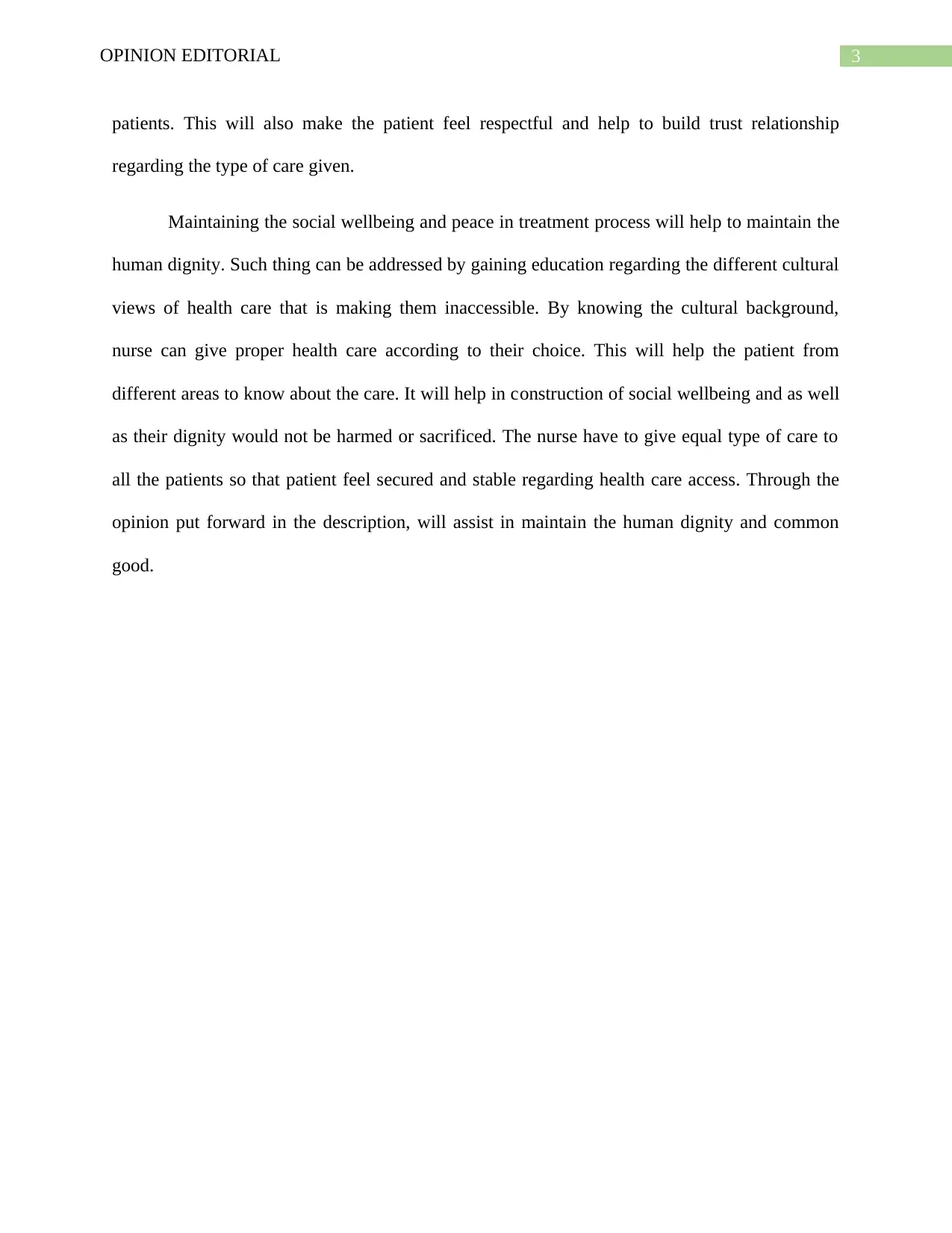
3OPINION EDITORIAL
patients. This will also make the patient feel respectful and help to build trust relationship
regarding the type of care given.
Maintaining the social wellbeing and peace in treatment process will help to maintain the
human dignity. Such thing can be addressed by gaining education regarding the different cultural
views of health care that is making them inaccessible. By knowing the cultural background,
nurse can give proper health care according to their choice. This will help the patient from
different areas to know about the care. It will help in construction of social wellbeing and as well
as their dignity would not be harmed or sacrificed. The nurse have to give equal type of care to
all the patients so that patient feel secured and stable regarding health care access. Through the
opinion put forward in the description, will assist in maintain the human dignity and common
good.
patients. This will also make the patient feel respectful and help to build trust relationship
regarding the type of care given.
Maintaining the social wellbeing and peace in treatment process will help to maintain the
human dignity. Such thing can be addressed by gaining education regarding the different cultural
views of health care that is making them inaccessible. By knowing the cultural background,
nurse can give proper health care according to their choice. This will help the patient from
different areas to know about the care. It will help in construction of social wellbeing and as well
as their dignity would not be harmed or sacrificed. The nurse have to give equal type of care to
all the patients so that patient feel secured and stable regarding health care access. Through the
opinion put forward in the description, will assist in maintain the human dignity and common
good.
Paraphrase This Document
Need a fresh take? Get an instant paraphrase of this document with our AI Paraphraser
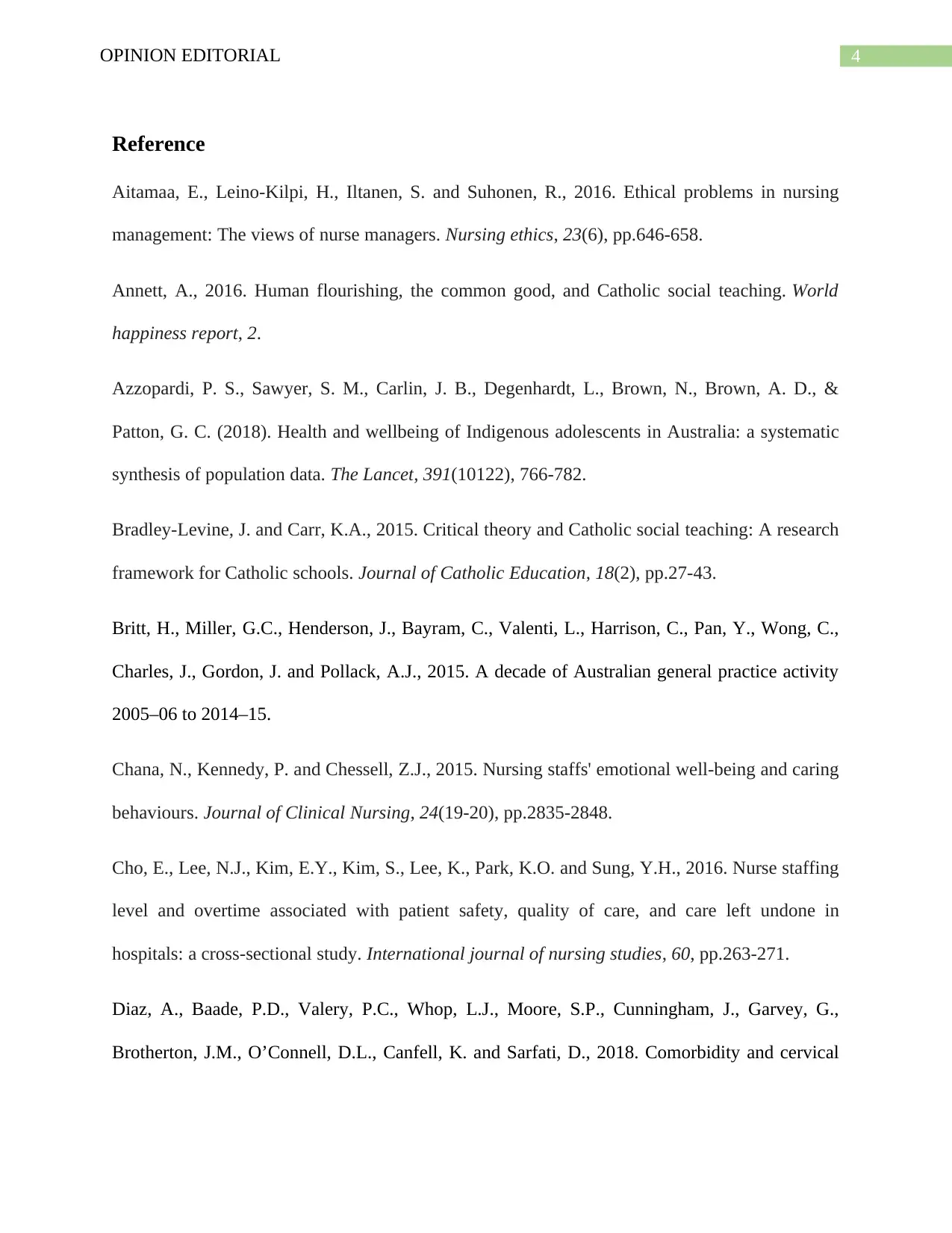
4OPINION EDITORIAL
Reference
Aitamaa, E., Leino-Kilpi, H., Iltanen, S. and Suhonen, R., 2016. Ethical problems in nursing
management: The views of nurse managers. Nursing ethics, 23(6), pp.646-658.
Annett, A., 2016. Human flourishing, the common good, and Catholic social teaching. World
happiness report, 2.
Azzopardi, P. S., Sawyer, S. M., Carlin, J. B., Degenhardt, L., Brown, N., Brown, A. D., &
Patton, G. C. (2018). Health and wellbeing of Indigenous adolescents in Australia: a systematic
synthesis of population data. The Lancet, 391(10122), 766-782.
Bradley-Levine, J. and Carr, K.A., 2015. Critical theory and Catholic social teaching: A research
framework for Catholic schools. Journal of Catholic Education, 18(2), pp.27-43.
Britt, H., Miller, G.C., Henderson, J., Bayram, C., Valenti, L., Harrison, C., Pan, Y., Wong, C.,
Charles, J., Gordon, J. and Pollack, A.J., 2015. A decade of Australian general practice activity
2005–06 to 2014–15.
Chana, N., Kennedy, P. and Chessell, Z.J., 2015. Nursing staffs' emotional well‐being and caring
behaviours. Journal of Clinical Nursing, 24(19-20), pp.2835-2848.
Cho, E., Lee, N.J., Kim, E.Y., Kim, S., Lee, K., Park, K.O. and Sung, Y.H., 2016. Nurse staffing
level and overtime associated with patient safety, quality of care, and care left undone in
hospitals: a cross-sectional study. International journal of nursing studies, 60, pp.263-271.
Diaz, A., Baade, P.D., Valery, P.C., Whop, L.J., Moore, S.P., Cunningham, J., Garvey, G.,
Brotherton, J.M., O’Connell, D.L., Canfell, K. and Sarfati, D., 2018. Comorbidity and cervical
Reference
Aitamaa, E., Leino-Kilpi, H., Iltanen, S. and Suhonen, R., 2016. Ethical problems in nursing
management: The views of nurse managers. Nursing ethics, 23(6), pp.646-658.
Annett, A., 2016. Human flourishing, the common good, and Catholic social teaching. World
happiness report, 2.
Azzopardi, P. S., Sawyer, S. M., Carlin, J. B., Degenhardt, L., Brown, N., Brown, A. D., &
Patton, G. C. (2018). Health and wellbeing of Indigenous adolescents in Australia: a systematic
synthesis of population data. The Lancet, 391(10122), 766-782.
Bradley-Levine, J. and Carr, K.A., 2015. Critical theory and Catholic social teaching: A research
framework for Catholic schools. Journal of Catholic Education, 18(2), pp.27-43.
Britt, H., Miller, G.C., Henderson, J., Bayram, C., Valenti, L., Harrison, C., Pan, Y., Wong, C.,
Charles, J., Gordon, J. and Pollack, A.J., 2015. A decade of Australian general practice activity
2005–06 to 2014–15.
Chana, N., Kennedy, P. and Chessell, Z.J., 2015. Nursing staffs' emotional well‐being and caring
behaviours. Journal of Clinical Nursing, 24(19-20), pp.2835-2848.
Cho, E., Lee, N.J., Kim, E.Y., Kim, S., Lee, K., Park, K.O. and Sung, Y.H., 2016. Nurse staffing
level and overtime associated with patient safety, quality of care, and care left undone in
hospitals: a cross-sectional study. International journal of nursing studies, 60, pp.263-271.
Diaz, A., Baade, P.D., Valery, P.C., Whop, L.J., Moore, S.P., Cunningham, J., Garvey, G.,
Brotherton, J.M., O’Connell, D.L., Canfell, K. and Sarfati, D., 2018. Comorbidity and cervical
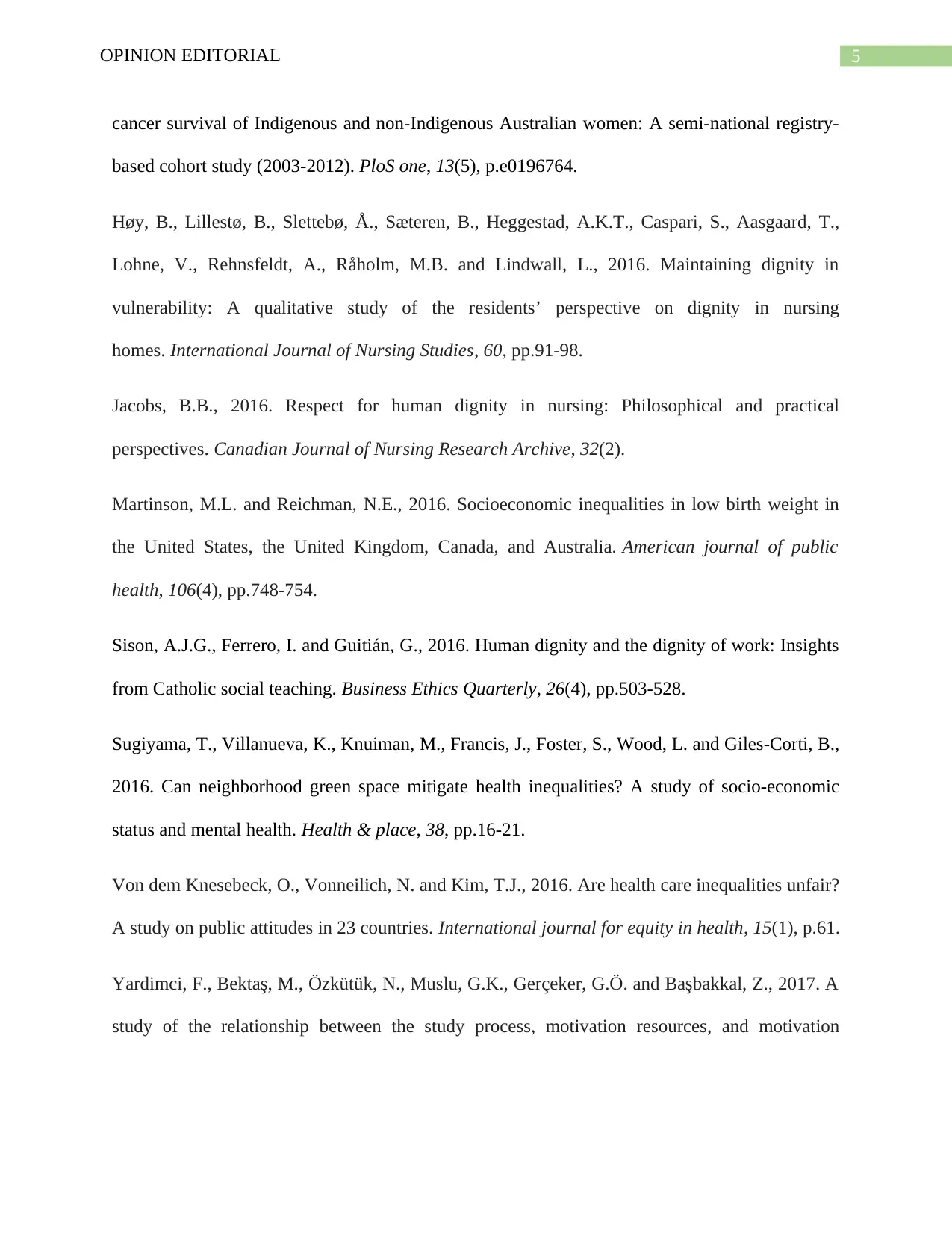
5OPINION EDITORIAL
cancer survival of Indigenous and non-Indigenous Australian women: A semi-national registry-
based cohort study (2003-2012). PloS one, 13(5), p.e0196764.
Høy, B., Lillestø, B., Slettebø, Å., Sæteren, B., Heggestad, A.K.T., Caspari, S., Aasgaard, T.,
Lohne, V., Rehnsfeldt, A., Råholm, M.B. and Lindwall, L., 2016. Maintaining dignity in
vulnerability: A qualitative study of the residents’ perspective on dignity in nursing
homes. International Journal of Nursing Studies, 60, pp.91-98.
Jacobs, B.B., 2016. Respect for human dignity in nursing: Philosophical and practical
perspectives. Canadian Journal of Nursing Research Archive, 32(2).
Martinson, M.L. and Reichman, N.E., 2016. Socioeconomic inequalities in low birth weight in
the United States, the United Kingdom, Canada, and Australia. American journal of public
health, 106(4), pp.748-754.
Sison, A.J.G., Ferrero, I. and Guitián, G., 2016. Human dignity and the dignity of work: Insights
from Catholic social teaching. Business Ethics Quarterly, 26(4), pp.503-528.
Sugiyama, T., Villanueva, K., Knuiman, M., Francis, J., Foster, S., Wood, L. and Giles-Corti, B.,
2016. Can neighborhood green space mitigate health inequalities? A study of socio-economic
status and mental health. Health & place, 38, pp.16-21.
Von dem Knesebeck, O., Vonneilich, N. and Kim, T.J., 2016. Are health care inequalities unfair?
A study on public attitudes in 23 countries. International journal for equity in health, 15(1), p.61.
Yardimci, F., Bektaş, M., Özkütük, N., Muslu, G.K., Gerçeker, G.Ö. and Başbakkal, Z., 2017. A
study of the relationship between the study process, motivation resources, and motivation
cancer survival of Indigenous and non-Indigenous Australian women: A semi-national registry-
based cohort study (2003-2012). PloS one, 13(5), p.e0196764.
Høy, B., Lillestø, B., Slettebø, Å., Sæteren, B., Heggestad, A.K.T., Caspari, S., Aasgaard, T.,
Lohne, V., Rehnsfeldt, A., Råholm, M.B. and Lindwall, L., 2016. Maintaining dignity in
vulnerability: A qualitative study of the residents’ perspective on dignity in nursing
homes. International Journal of Nursing Studies, 60, pp.91-98.
Jacobs, B.B., 2016. Respect for human dignity in nursing: Philosophical and practical
perspectives. Canadian Journal of Nursing Research Archive, 32(2).
Martinson, M.L. and Reichman, N.E., 2016. Socioeconomic inequalities in low birth weight in
the United States, the United Kingdom, Canada, and Australia. American journal of public
health, 106(4), pp.748-754.
Sison, A.J.G., Ferrero, I. and Guitián, G., 2016. Human dignity and the dignity of work: Insights
from Catholic social teaching. Business Ethics Quarterly, 26(4), pp.503-528.
Sugiyama, T., Villanueva, K., Knuiman, M., Francis, J., Foster, S., Wood, L. and Giles-Corti, B.,
2016. Can neighborhood green space mitigate health inequalities? A study of socio-economic
status and mental health. Health & place, 38, pp.16-21.
Von dem Knesebeck, O., Vonneilich, N. and Kim, T.J., 2016. Are health care inequalities unfair?
A study on public attitudes in 23 countries. International journal for equity in health, 15(1), p.61.
Yardimci, F., Bektaş, M., Özkütük, N., Muslu, G.K., Gerçeker, G.Ö. and Başbakkal, Z., 2017. A
study of the relationship between the study process, motivation resources, and motivation
⊘ This is a preview!⊘
Do you want full access?
Subscribe today to unlock all pages.

Trusted by 1+ million students worldwide

6OPINION EDITORIAL
problems of nursing students in different educational systems. Nurse education today, 48, pp.13-
18.
problems of nursing students in different educational systems. Nurse education today, 48, pp.13-
18.
1 out of 7
Related Documents
Your All-in-One AI-Powered Toolkit for Academic Success.
+13062052269
info@desklib.com
Available 24*7 on WhatsApp / Email
![[object Object]](/_next/static/media/star-bottom.7253800d.svg)
Unlock your academic potential
Copyright © 2020–2026 A2Z Services. All Rights Reserved. Developed and managed by ZUCOL.





